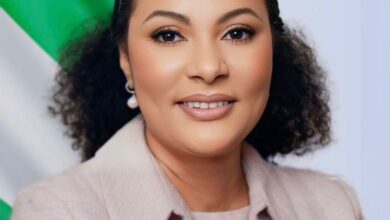Sadiya Umar-Farouq: Refocusing Social Security In Nigeria

The world over, successful governments have explored the social welfare agenda as a veritable platform through which masses’ support is guaranteed and sustained.
History has shown that upheavals and insurrection are hardly conceived in milieux where social inclusion is the norm, rather than the exception.
No doubt, progressive governments and leaders across the globe, see development as “homo-centred”, in which case, human beings are conceived as the focal points of governance.
It, therefore, did not come as a surprise, when President Muhammadu Buhari, known for his progressive inclination – both as a military leader and now – gave vivid expression to this avowal in August 2019, through the creation of the Ministry of Humanitarian Affairs, Disaster Management and Social Development.
It was Arlen Price, who said that, “where the heart is willing it will find a thousand ways; where it is unwilling it will find a thousand exvuses”.
Price’s position was echoed by Ralph Waldo Emerson, the 19th century American philosopher, who submitted, in a rather obtrusive and pungent note, that: “If a man (in generic form) can write a better book, preach a better sermon, or make a better mousetrap than his neighbor, though he build his house in the wood,s the world will make a beaten path to his door”.
Conscious of these declarations, coupled with his determination to remain a valued friend of the “Talakawas”, President Buhari appointed Sadiya Umar-Farouq as the pioneer Minister saddled with the enormous responsibility of driving the social investment programme of the government, in the face of humanitarian affairs and disaster management.
To be sure, the ministry was specifically created to “develop humanitarian policies and provide effective coordination of National and International humanitarian interventions; ensure strategic disaster mitigation, preparedness and response; and manage the formulation and implementation of fair focused social inclusion and protection programmes in Nigeria”.
Upon Umar-Farouk’s appointment last year, not a few had given her the benefit of the doubt, considering the “tevil twin” of age and gender – factors that constitute a clog in the will of progress of developing nations.
For objective-minded, constructive analysts, the last one year of Umar-Farouk’s stewardship has been characterised by breakthroughs that should ordinarily appeal to perception, and alter skewed narratives.
With the benefit of hindsight, it will be safe to argue that, never in the history of Nigeria have children of the poor, downtrodden and the wretched of the earth (apologies to Frantz Fanon), been so profoundly structured into the socio-political and economic equation than now.
The school feeding programme, which the naysayers have continued to draw blood, literally speaking, has not only encouraged families to embrace foundational education for their children, but also brought nutritional value to bear on meals.
Since the COVID-19 pandemic caught the world napping, majority of Nigerians have continued to wonder what would have become of the school children and their parents/guardians, had such intervention not come from the Umar-Farouq-led ministry.
Imagine what would have happened to the targeted children across the thirty-six states of the federation, and the federal Capital Territory (FCT), had such funds totalling N523.3 million not been expended on the school feeding programme during the lockdown, as reports indicate!
In their predictable disposition of de-marketing the government, those critics, known for their “de-market Nigeria” pastime, had lied, without statistical evidence, that Federal Government spent the sum of N13.5 billion monthly on the homegrown school feeding programme during the lockdown period.
Unknown to many, the minister did not undertake the modified homegrown school feeding programme (during the lockdown, without an accompanying presidential directive to that effect, which gave it a seal of legality.
Offering clarifications at a recent interview with a reputable organisation, the minister had said: “…President directed the Ministry of Humanitarian Affairs to liaise with State Governments and come up with modalities to continue the school feeding programme to ensure the children do not lose out on the nutritious foods being provided.
“Dry portions of food will be given to the parents of the children enrolled in the programme at a designated place.
Discussions were held through the Nigerian Governors Forum and plans were discussed and it was agreed that take home rations would be provided to the beneficiaries of the program using the existing Structures of the program based on the urgency of the situation at the time. This is termed the Modified Home-Grown School Feeding Programme.
“The daily cost of feeding a child of N70 was multiplied by number of days in a month and the amount of 4,200 which was used to purchase the food stuff. Items that were assessed not just for sustenance but also for their nutritional value to children are- rice for carbohydrates, beans and eggs for protein, salt for iodine palm oil and tomato paste for vitamins.
“For the sake of the exercise, an average of 3 children per family is assumed. The plan also identified that a typical household in Nigeria has 5.6–6 members with 3–4 being dependent and so each household was assumed to have 3 children.
“The data used is what was transferred with the school feeding program to the Ministry and is reported from validation exercises from NBS’.
She added thus: “It is worthy of note that at the onset of the pandemic, the national social register contained data of over 2.6 million poor and vulnerable households (with over 11 million individuals) across 34 states and the federal capital territory (FCT).
“With the accelerated registration and rapid expansion, the register has, as at June 30, grown to 3.7 million (equivalent to 15.5 million individuals) across 36 states and the FCT”.
In continuation of its interventionist role, the Ministry, which has under its supervision such agencies as National Emergency Management Agency, National Agency for the Prohibition of Trafficking in Persons among others, distributed different kinds of palliative materials to the vulnerable in society.
Among others, the ministry extended its touching life disposition to refugees and internally displaced persons, People Living with Disabilities, Older Persons, Trafficked Persons, Orphans, the Poorest of the Poor in Communities, Petty Traders and other Persons of Concern.
To be sure, such palliatives like rice, maize, millet, sorghum, vegetable oil, tomato paste, milk, sugar and spaghetti, were duly distributed to the vulnerable in our society.
Also under Umar-Farouk’s leadership, months of stipends have been paid (pronto) to beneficiaries of the Conditional Cash Transfer, with a view to cushioning the effect of the novel coronavirus disease, soft loans.
and moratorium to trader and market moni beneficiaries.
In the main, one form of intervention or the other across the federation, was undertaken during the lockdown period, which brought threat to the doorsteps of bonds, families, unions, and most especially, governmental affairs.
In continuation of its pro-people policy, the federal government, through the Umar-Farouq-led ministry, may have facilitated access to over two million small and medium-scale enterprises (SMEs), under the Government Enterprise and Empowerment Programme (GEEP)
Available statistics show that said programme haa so far provided loans ranging from N10,000 to N300,000 to citizens in the category of traders, artisans, enterprising youth, agricultural workers and other micro-service providers.
There are indications – very promising – that snce coming on stream in 2016, GEEP has granted empowerment to an estimated 2.3 million micro-enterprises.
Then comes another bold social inteeention programme of the President Buhari-led government known as N-Power, which has facilitated the establishment of at least 109,823 for beneficiaries of batches A and B, in their respective business domains.
There is the need to support the federal government in its plan towarda the establishment of the national disability commission, side-by-side with the enactment of the novel national senior citizens’ centre.
As unassuming as the minister is known for, she did not suppress the challenges so far encountered in her ministry’s drive towards executing the pro-people mandate of the President Buhari-led administration’s.
In the referenced engagement, Umar-Farouq had said, inter alias, that: “So far…for the one year we have been in existence, I would say it has been both challenging and very rewarding. Challenging in the sense that the Ministry is new and taking over responsibilities that were hitherto domiciled in other MDAs and also providing the much-needed coordination of humanitarian interventions in Nigeria”.
She added: “Rewarding in the sense that when I visit the field and I see beneficiaries whose lives are being changed by the Federal Government humanitarian interventions, it leaves us with a sense of fulfilment that we are doing something for humanity.
“We have also received tremendous support and hands of friendship and partnership extended to the Ministry from different quarters for which we are grateful.
All people of goodwill must, as a matter of national priority, support the Preaident Buhari instigated, Umar-Farouk-driven social investment revolution across the country, to ensure that Nigeria navigates out of the vexed turbulence of “poverty capital of the world”.






